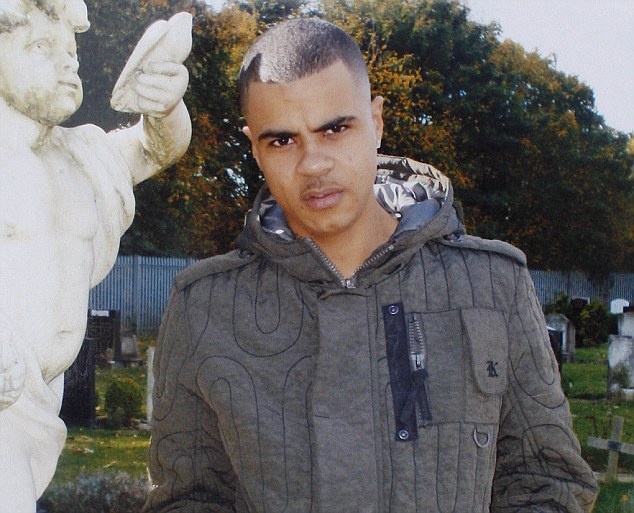
Ahead of the belated inquest into the 2011 fatal shooting of Mark Duggan, which helped to spark the worst riots in recent UK history, the “Independent” Police Complaints Commission have fed headlines across the mainstream media that there was “No criminality” from the police officers involved in the death.
The timing and wording of the statement is particularly telling, considering the inquest and therefore the facts surrounding his death have yet to be properly and fairly considered outside of the controversial commission themselves. The related trial of supposed gun supplier Mr. Hutchinson-Foster has raised more questions than it answered. In fact it shed doubt on whether Duggan even had a gun on his person at all.
The firearm was found about “five metres away” (16 feet) from his body, on the other side of some railings, in a sock [1], a distance and position expert witness Professor Jonathan Clasper could find no explanation for [2]. Neither Duggan’s DNA or fingerprints were recovered from the sock or weapon [3]. Foster’s trial had to take place twice because the jury couldn’t come to the desired verdict the first time.
If one takes a critical look at the case, technically no wrongdoing by Duggan has ever been proven. Despite this the IPCC appear to want the public to come to a pre-emptive conclusion of police innocence before the inquest even examines Duggan’s death, and the press are more than happy to oblige with a “trial by media”, where irrelevant talking points about “gangster” Duggan are being regurgitated as if he’d been on trial and was convicted of a crime. Regardless of what ignorant Daily Mail Online users want to spout, Justice and fairness is for everyone, including people you don’t like or who may have been drug dealers.
Wrongdoing by the MET Police and IPCC has been documented since day 1 of the killing, drawing into question the credibility of any dubious statements they want to tactically make now.
Originally officers from the Met’s Trident team said Duggan had fired a gun supplied by Hutchinson-Foster, giving them grounds to shoot back. However this scenario was proven impossible, because the bullet found lodged in the chest radio of one of the officers was actually from a Trident firearm. Ballistics determined the only weapons fired, indeed the only bullets recovered from the scene originated from police weapons. The IPCC had to concede that they may have given misleading information to journalists [4], and therefore did not properly investigate the shooting before coming to a conclusion.
In November 2011, two members of the public who were appointed to liaise with the IPCC on the Duggan case, resigned [5], with one stating that the IPCC work was “shoddy.”
Then in February 2012 the IPCC were forced to apologize for not investigating a complaint by Duggan’s family that the MET police failed to adequately inform them of his death [6], and they had to discover the news by themselves.
“They’ve been incompetent from day one,” Duggan’s aunt, Carole, told Sky News.
“They’ve had to apologise to us as a family on numerous occasions because they’ve not investigated thoroughly. They’ve not been transparent at all.”
“It’s been two years and we are now waiting for the inquest to get the answers to the questions we have about how and why Mark was killed,” she said.
So just who are the IPCC, what is their role, and what is their track record?
When a regular member of the public is implicated in the death of somebody, they are questioned, evidence is gathered and if it is strong enough they are charged and go on trial. However if the police are implicated in the death of somebody while on police business, the IPCC mounts an investigation and then basically just issues a report. Although they technically have police powers, in that they can arrest and charge suspect police officers for crimes (such as murder or manslaughter), this is an extremely rare occurrence. In fact despite being established in April 2004, the first known use of these arrest powers was in 2007 when a former police officer was arrested and later convicted of sexual assault [7].
High profile murders by police, such as the murder of innocent tube passenger Jean Charles de Menezes, who was shot 7 times at point blank range in the head, are simply ruled “unlawful” killings, with no actual criminal repercussions for the murderers.
So in context, under the IPCC only one police officer has ever been arrested for a crime! Even more shocking, since 1998 at least 333 people have died while in police custody or at the hands of the police [8], but not one officer has ever been convicted of any crime, let alone murder or manslaughter!
In light of IPCC failings over a hundred lawyers who specialise in handling police complaints, under the Police Action Lawyers Group resigned in 2008 [9], citing a pattern of favouritism towards the police, indifference and rudeness towards complainants and complaints being rejected in spite of apparently powerful evidence in their support.
A 2012 parliamentary inquiry set up in the wake of the death of Ian Tomlinson concluded in January 2013 that the IPCC, “has neither the powers nor the resources that it needs to get to the truth when the integrity of the police is in doubt.”[10]
Regardless of personal prejudices or hunches, Duggan’s death should not be taken out of this context. There is absolutely no credibility from the authorities in such cases and justice should not be ignored, just because we assume Duggan was a bad man.
A full inquest into his death is expected to open in September, though it has already been pushed back several times, while the IPCC and MET are given free reign over misleading media headlines.
Further Reading:
Police Further Contradicted Over Mark Duggan Shooting




